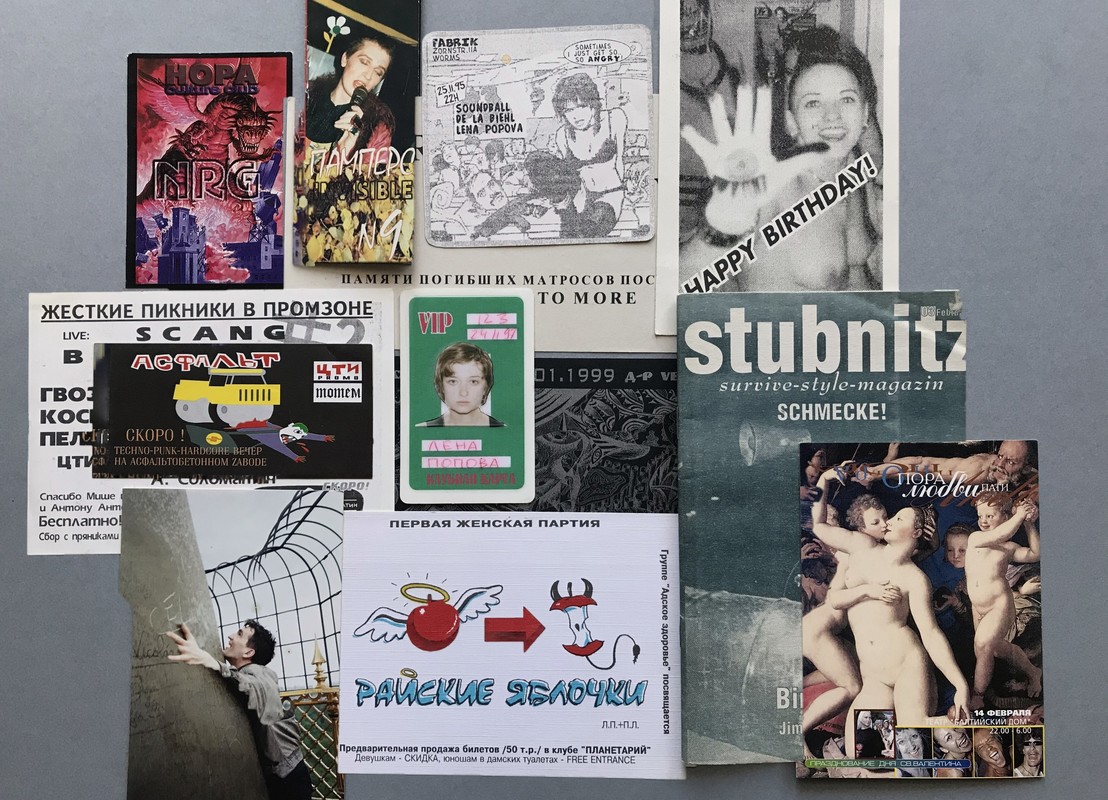Lena Popova Archive
Lena Popova began collecting her archive in the first half of the 1990s. It comprises documents on the history of club culture in St. Petersburg and its connection to contemporary art. The archive features ephemera, press cuttings, photographs, and documents related to Popova’s own creative projects.
The selection of ephemera includes flyers and invitations to St. Petersburg dance parties from the first half of the 1990s through the early 2000s, which took place in the clubs Tonnel, Planetarium, and Griboedov. The archive also contains ephemera from open airs: an invitation card to the first travel rave on the ruined Znamenka state (1996) and flyers for “tough picnics” organized in industrial zones by Tsentr Tizholava Izkustva and other parties in the St. Petersburg suburbs. Of particular note are the flyers for “girls only” club events with dressing up and themed sets from female DJs, including Lena Popova and DJ Angela. The archive also contains ephemera of projects bringing together electronic music and visual art: the Stubnitz art boat and raves at which Vladislav Mamyshev‑Monroe, the Rechniki group, Tsentr Tizholava Izkustva (Igor Mezheritsky and Artem Solomatin), and other artists acted as organizers, performers, and set designers.
The archive contains photographic portraits of Timur Novikov, Georgy Guryanov, Andrei Khlobystin, Oleg Maslov and Viktor Kuznetsov, Bella Matveeva, and other representatives of the St. Petersburg art scene. A separate section comprises documentary photography from various openings, including exhibitions at the New Academy of Fine Arts and Borey Gallery, backstage shoots of the projects Woe from Wit by Olga Tobreluts and Russian Questions by Vladislav Mamyshev‑Monroe, the costume gig Hitler’s Last Party at the Tonnel club (1993), and photographs of Timur Novikov and Andrei Khlobystin’s trips to Berlin in the mid‑1990s.
The archive also features a selection of rare thematic magazines from the 1990s covering avant‑garde fashion, new lifestyles, and electronic music. Likbez, Ptyuch, Zanoza, and issues of Pampers magazine, published by the club Griboedov, are vivid examples of the visual culture of their time, featuring interviews with Lena Popova and other musicians who pioneered Russian club culture.
Lena Popova (b. 1968, Kalinin) is a techno DJ, radio host, and a participant and organizer of the first club parties and large‑scale raves and open airs in Russia. Popova’s music career began in 1994, when she became a resident and promoter of the Tonnel techno club (St. Petersburg, 1993–1997/2002–2011). With her participation, the club organized thematic art parties, exhibitions of contemporary art, and education events dedicated to media art and philosophy.
In the mid‑1990s, Popova contributed to a number of projects by artists from the New Academy of Fine Arts, including Oleg Maslov and Viktor Kuznetsov’s Blue Lagoon (1993–1994) and the film Woe from Wit (1994) by Olga Tobreluts, while also participating in the filming of Vladislav Mamyshev‑Monroe’s photographic series Russian Questions (1997). She curated several projects at Pushkinskaya 10, as well as the show Family Album (with Andrei Khlobystin, 1992) at Borey Gallery (St. Petersburg).
In 1998, she co‑hosted (with Aleksei Haas) the program Dynamite on the noncommercial radio station Port FM, featuring guest artists, DJs, and musicians, including Timur Novikov, Vladislav Mamyshev‑Monroe, and Oleg Maslov. Drawing on the legacy of girls only parties, in 2003 Popova launched the feminist music project Provençal, a platform exclusively for female DJs. Since 2001 she has hosted the program Technical Break, which covers noncommercial electronic music, on St. Petersburg’s Radio Record. She lives and works in St. Petersburg.
- Collections
- Persons
- Keywords
- Type of entry
- Place
- Time span
